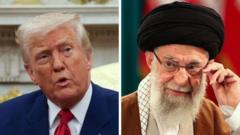The next round of Iran-US nuclear talks, initially set for Saturday in Rome, has been canceled amid escalating sanctions and threats.
**Delayed Iran-US Nuclear Talks: Looming Tensions and Uncertain Futures**

**Delayed Iran-US Nuclear Talks: Looming Tensions and Uncertain Futures**
The postponement of vital discussions reflects ongoing geopolitical tensions.
The fourth round of scheduled nuclear negotiations between Iran and the United States has been postponed, further complicating the already fraught diplomatic landscape. This decision was jointly made by Iran and the US, supported by facilitator Oman. Official reasons cited for the delay include "logistical and technical reasons." However, the US government explained that the meeting's timing had not yet been established.
This announcement arrives on the heels of US President Donald Trump's warning of potential repercussions against those purchasing Iranian oil and petrochemicals. New sanctions imposed on several companies linked to Tehran added pressure on the negotiations that have been repositioned since Trump withdrew from the prior nuclear agreement in 2018. The President has asserted a desire to establish a more favorable deal, while simultaneously indicating the possibility of military action should talks fail.
While both parties initially described the first round of discussions held in Muscat, Oman, as "constructive," a sense of uncertainty looms. Iran's Foreign Minister Seyed Abbas Araghchi reaffirmed Tehran's commitment to finding a negotiated solution, stressing the need for an agreement that aligns with Iranian rights and guarantees the peaceful nature of its nuclear program.
Despite the apparent eagerness to avoid escalating conflict, skepticism has arisen in Tehran regarding the utility of further dialogues, particularly in light of the recent sanctions deemed contradictory by Iranian officials. The US maintains that their sanctions are a necessary measure to counteract Iran's alleged destabilizing activities across the Middle East and its nuclear ambitions.
President Trump has also increased rhetoric through social media, asserting that any party engaging with Iranian oil would face secondary sanctions, blocking them from business with the United States. New statements from US officials, including Secretary of Defense Pete Hegseth, have communicated a stern warning directed at Iran concerning its support for Houthi rebels in Yemen.
As the US pursues a resolution aimed at curtailing Iran’s potential for nuclear weapon development, internal divisions within the administration suggest a push for more extensive dismantling of Iran’s enrichment capabilities. Conversely, Iran is advocating for a compromise that would permit limited enrichment in exchange for sanctions relief. As the clock ticks down, both nations remain at an impasse, with broader economic implications hanging in the balance amid the most extensive sanctions the country has endured.
This announcement arrives on the heels of US President Donald Trump's warning of potential repercussions against those purchasing Iranian oil and petrochemicals. New sanctions imposed on several companies linked to Tehran added pressure on the negotiations that have been repositioned since Trump withdrew from the prior nuclear agreement in 2018. The President has asserted a desire to establish a more favorable deal, while simultaneously indicating the possibility of military action should talks fail.
While both parties initially described the first round of discussions held in Muscat, Oman, as "constructive," a sense of uncertainty looms. Iran's Foreign Minister Seyed Abbas Araghchi reaffirmed Tehran's commitment to finding a negotiated solution, stressing the need for an agreement that aligns with Iranian rights and guarantees the peaceful nature of its nuclear program.
Despite the apparent eagerness to avoid escalating conflict, skepticism has arisen in Tehran regarding the utility of further dialogues, particularly in light of the recent sanctions deemed contradictory by Iranian officials. The US maintains that their sanctions are a necessary measure to counteract Iran's alleged destabilizing activities across the Middle East and its nuclear ambitions.
President Trump has also increased rhetoric through social media, asserting that any party engaging with Iranian oil would face secondary sanctions, blocking them from business with the United States. New statements from US officials, including Secretary of Defense Pete Hegseth, have communicated a stern warning directed at Iran concerning its support for Houthi rebels in Yemen.
As the US pursues a resolution aimed at curtailing Iran’s potential for nuclear weapon development, internal divisions within the administration suggest a push for more extensive dismantling of Iran’s enrichment capabilities. Conversely, Iran is advocating for a compromise that would permit limited enrichment in exchange for sanctions relief. As the clock ticks down, both nations remain at an impasse, with broader economic implications hanging in the balance amid the most extensive sanctions the country has endured.






















